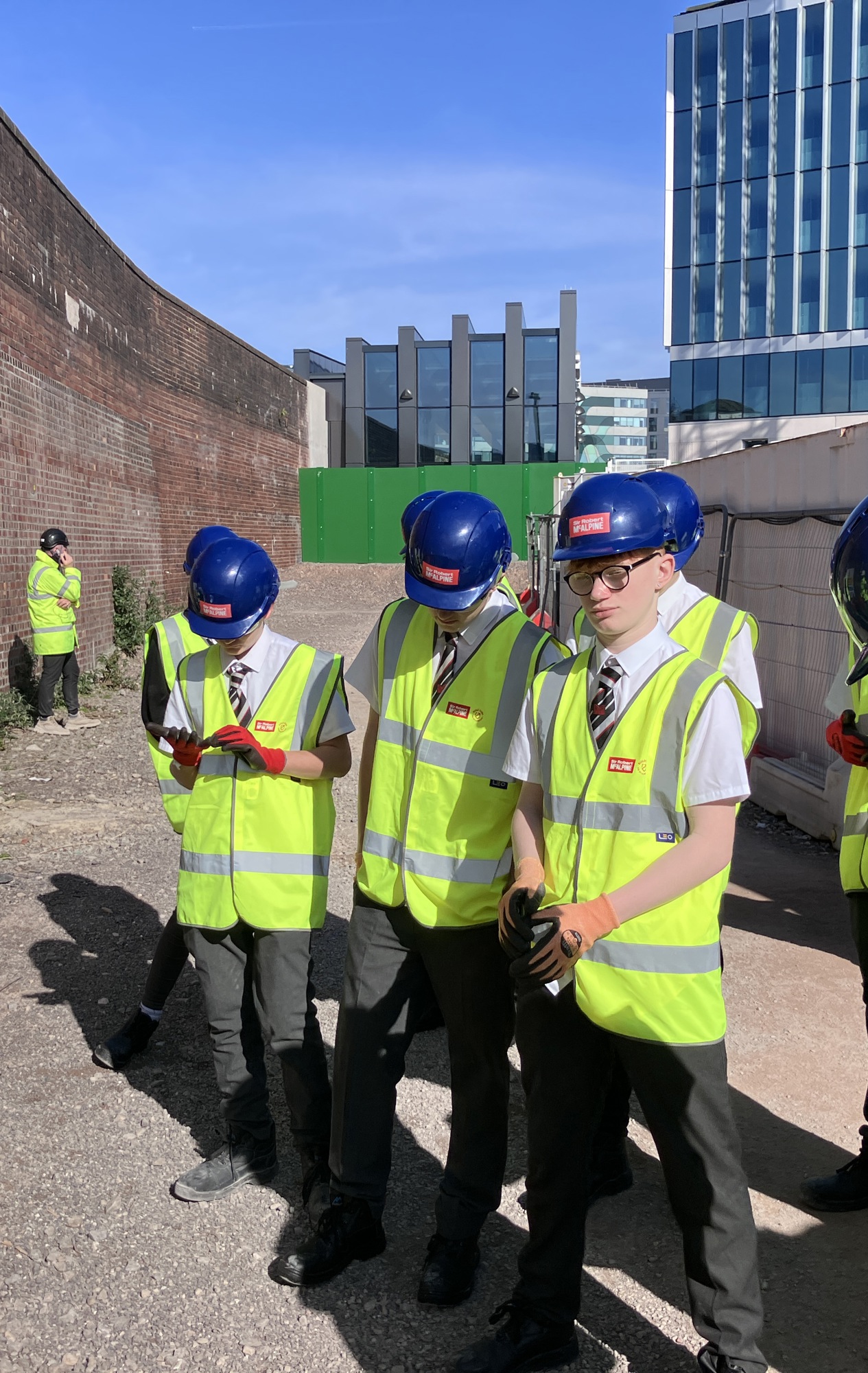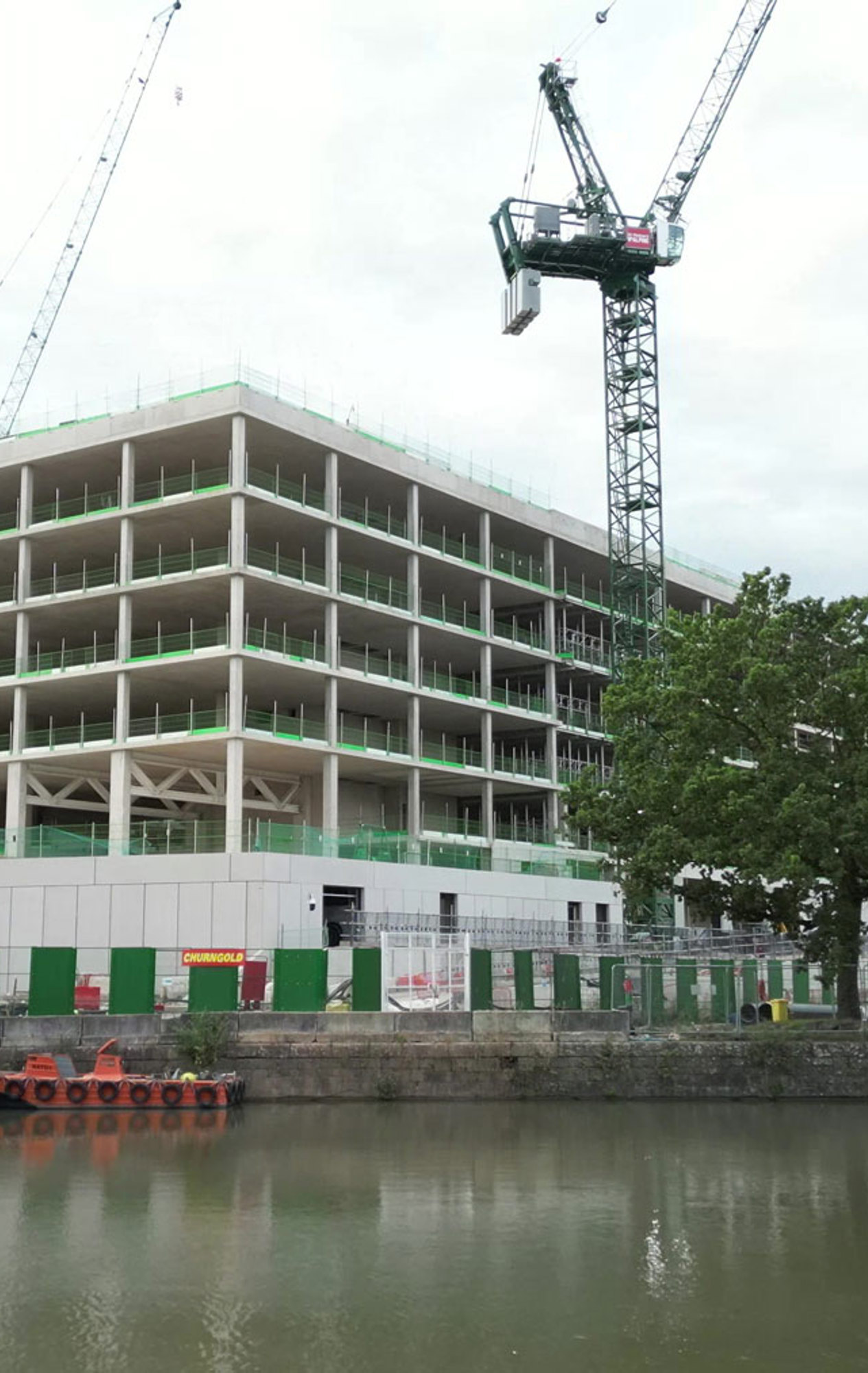- Client: University of Bristol
- Sector: Education
- Theme: Sustainability
- Service: Construction
- Completion Date: 2026
Temple Quarter Enterprise Campus
We are constructing a new, world-class campus for the University of Bristol.
Standing next to Bristol Temple Meads station, the Temple Quarter Enterprise Campus sits at the centre of one of Bristol’s most ambitious regeneration projects.
Due to complete in 2026, this new six-storey, 38,350 square metre academic building will become home to 4,600 students and 650 university staff.
The state-of-the-art facility will serve as a hub for innovation and entrepreneurship, strengthening connections between the University, businesses, and the community, while driving socio-economic growth in Bristol and the wider region.
As well as boasting exceptional academic facilities, the campus will also be a hub for local communities and is the catalyst for the wider redevelopment of Bristol Temple Quarter.
Project summary
Reducing our impact on the environment
In line with our commitment to reduce carbon emissions, we collaborated throughout the design stage and engaged our supply chain partners to significantly reduce embodied carbon.
During the Pre-Construction Services Agreement (PCSA) period we conducted a value engineering exercise alongside Buro Happold, reducing a 15m x 7.5m structural steel frame grid to 7.5m x 7.5m with a reinforced concrete slab solution. This change allowed for a more focused provision of flexible space, meeting the client’s requirements, and the newly optimised design reduced upfront embodied carbon by almost half.
Following those carbon savings, approximately 70% of the remaining emissions were associated with the embodied carbon of the ready-mix concrete, so reducing the carbon intensity of this material was critical during procurement. We undertook a series of workshops with relevant concrete subcontractors to reduce embodied carbon while managing cost and not compromising on quality. As a result, more than 90% of concrete poured (by volume) achieved the definition of ‘low embodied carbon concrete’ with emission savings of approximately 25%.
A collaborative approach was instrumental in such a sizeable reduction in embodied carbon and underscores what can be achieved when embedding low-carbon engineering principles in the design phase.
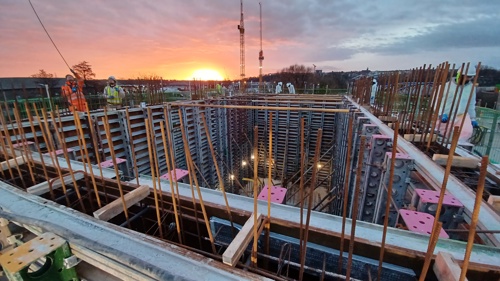
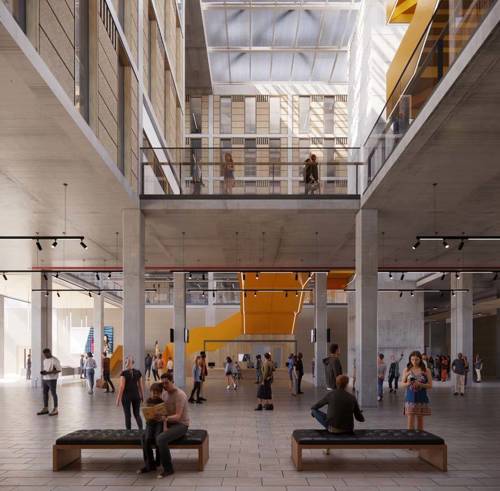
Being at forefront of modern construction methods
We have worked with our supply chain to embrace off-site prefabrication as much as possible. By engaging extensively with our mechanical and electrical contractor, NG Bailey, during the PCSA period, we were able to tackle design challenges head on and utilise their fabrication capabilities. As a result, much of their work came to site ready to be installed while also meeting the architect’s aesthetic vision once in place.
More than 1,200 unitised cladding panels will be installed, along with 370 precast concrete panels to clad the frame at ground level. Even the statement yellow staircases have been fabricated off-site by local contractor, Taunton Fabrications.
Estimates into the benefits of prefabrication show a saving of approximately 50,000 hours of labour on site, which has helped secure our programme and maximised quality on the project.
Embracing digital technology
Construction work at TQEC has been aided by the adoption of the latest digital technologies which are enhancing efficiency and reducing cost.
The team used an automated robot to drill around 22,000 holes in the slab soffit. The Hilti Jaibot autonomously moves along the floor plate, locates itself on setting out stations and uses the 3D BIM model to accurately drill around 500 holes per day. The Jaibot requires a mature BIM model, which we were able to achieve by working closely with NG Bailey through the design stage. The benefits of the technology have proved plentiful, from increased accuracy and speed, to mitigating potential health and safety risks.
We have also benefited from the use of Buildots, an AI technology used across our projects to objectively track progress. The platform’s ability to provide early warnings about potential delays and identify issues before they escalate has been critical in maintaining project schedules and avoiding potentially costly setbacks.
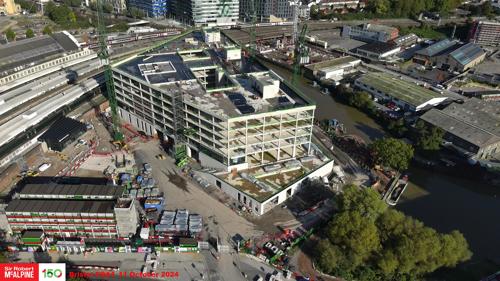

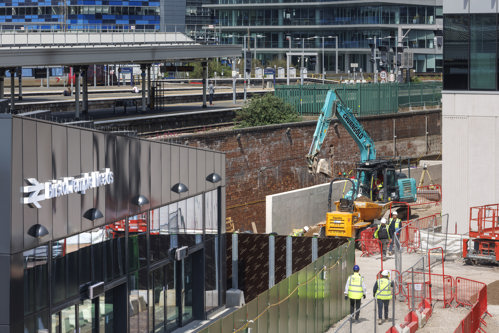
Managing tight logistics
As well as sharing a bordering wall with one of the South West’s busiest train stations, the site sits alongside a main road, cycle superhighway and the city’s floating harbour. TQEC is one of many construction sites in this area of Bristol, so collaboration to avoid unnecessary disruption to those who visit, live and work in Bristol is key.
Our team are central to a forum created by Bristol City Council, bringing stakeholders together monthly to discuss respective requirements and ensure all projects run as seamlessly as possible. Through this forum, we have been able to co-ordinate deliveries and logistics, and ensure any highways or utility upgrades work in harmony rather than clash and overlap, causing unnecessary disruption.
We have maintained a close relationship with Network Rail, whose new Eastern entrance protrudes onto the site, and Bristol City Council, who are constructing a new harbour walkway. A comprehensive system is in place with Network Rail to ensure any movement along the bordering wall is constantly monitored, and we have liaised with them to secure necessary approvals in a timely manner – key to keeping the programme on schedule.
Building a bright future
The legacy we are leaving in Bristol extends beyond an iconic new building. Through an extensive social value programme, we are helping to address the skills gap and provide young adults with a clear pathway into the industry.
In partnership with the client, we are delivering Design Engineer Construct (DEC) at a local secondary school, IKB Academy. The school has adopted a 'Level 3 Diploma in Design, Engineer, Construct! The Digital Built Environment (RQF)', which is comparable to an A Level. Students are tapping into the expertise of our workforce through workshops and site visits as they increase their understanding of professional practice in the digital built environment.
The site team have welcomed no fewer than 46 apprentices on the project thus far, with 20 of those being completely new to construction - a fantastic result for the industry.
Other support includes informative site visits and presentations to the Bristol ICE early careers network, local built environment charity Design West, and students from the University of Bath and the University of Bristol.

Latest news from Temple Quarter Enterprise Campus
-
![]() Read more about
Read more aboutTQEC connects to Bristol heat network
20 Nov 2025Energy from the project's computer servers will be used to provide heating and hot water for the campus, as well as homes and businesses in the local area
-
![]() Read more about
Read more aboutBuilding social value at TQEC
11 Jul 2025With skills shortages affecting every area of the construction industry, it’s vital that young people feel involved with the projects taking place across our cities.
-
![]() Read more about
Read more aboutReducing carbon emissions at TQA1
17 Mar 2025Early collaboration in the design stage and engagement with supply chain enable Temple Quarter Enterprise Campus to achieve a 25% reduction in embodied carbon.






